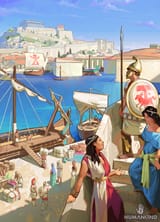>>515501886
>>515502905
>>515503505
>>515504220
>>515520262
>Aristotle claims that "the voice of the people was predominant in the deliberations" and that "the people themselves solved problems".[8] He and Herodotus portray the Carthaginian government as more meritocratic than some Hellenistic counterparts, with "great men" like Hamilcar being elected to "royal office" based on "outstanding achievements" and "special merit".[138] Aristotle also praises Carthage's political system for its "balanced" elements of monarchy, aristocracy, and democracy. His Athenian contemporary, Isocrates, elevates Carthage's political system as the best in antiquity, equaled only by that of Sparta.[139]
>It is noteworthy that Aristotle ascribes to Carthage a position among the Greek states, because the Greeks firmly believed that they alone had the ability to found 'poleis', whereas the barbarians used to live in tribal societies ('ethne'). It is therefore remarkable that Aristotle maintained that the Carthaginians were the only non-Greek people who had created a 'polis'. Like Crete and Sparta, Aristotle considers Carthage as an outstanding example of an ideal society.[138]
>Carthage reportedly had a constitution of some form. Aristotle compare's Carthage's constitution favorably to its well-regarded Spartan counterpart, describing it as sophisticated, functional, and fulfilling "all needs of moderation and justice".[144][145] Eratosthenes (c. 276 BC – c.194 BC), a Greek polymath and head of the Library of Alexandria, praises the Carthaginians as among the few barbarians to be refined and "admirably" governed.[146] Some scholars suggest the Greeks generally held Carthage's institutions in high regard, regarding the Carthaginians as close to equal.[138]
